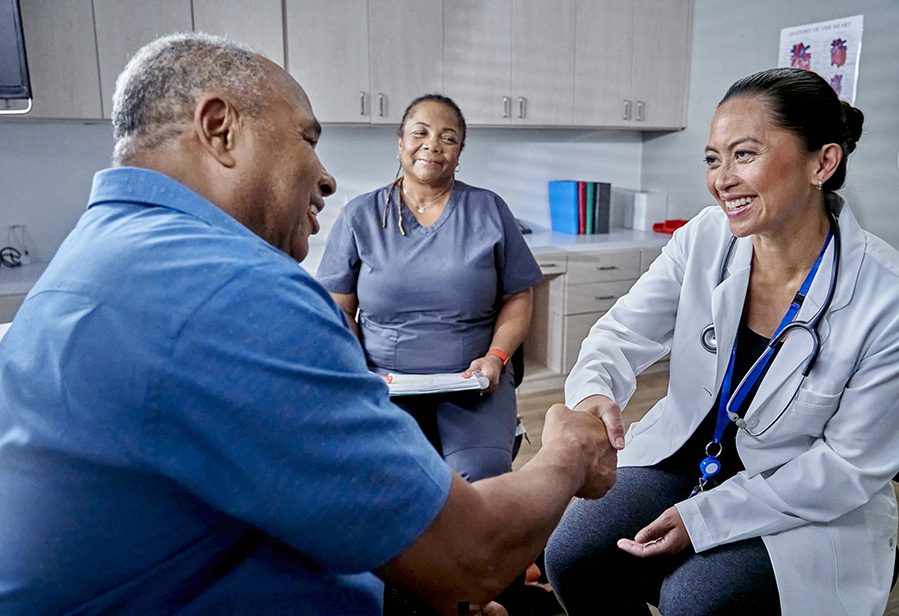When it comes to the prevention of serious disease and medical conditions, early detection is key, which is where a comprehensive approach to preventive care & screenings comes in.

But what is preventive care and screenings, what services are offered by Intermountain Health, how much does it cost, and how often do you need screenings at your age?
Here is what you need to know.
What is Preventive Care?
Preventative care involves the early detection and prevention of diseases and medical conditions before they become major. This can include immunizations such as flu shots, annual checkups, counseling, screenings such as mammograms, and other tests. This differs from diagnostic care in that diagnostic screenings look for a specific condition, where as preventative screenings are a comprehensive exploration to find potential problems.
Once a condition is discovered, diagnostic care involves the specific diagnosis, exploration, and treatment of that condition.
For instance, a routine preventive screening may reveal a cancerous tumor that then needs more specific diagnosis and care relating directly to it, which then become diagnostic care.
What Are Preventive Care Services?
Preventive care services may include screenings, counseling, or checkups such as:
- Blood Pressure Screening–High blood pressure leads to many dangerous health conditions, including heart attack and stroke. No matter your age, knowing your numbers using this simple, non-invasive procedure can make all the difference in understanding how to keep yours healthy.
- Type II Diabetes Screening–This debilitating disease is the result of too little insulin being produced in the body. Since insulin is responsible for controlling blood sugar, this results in a dangerous condition that can also lead to heart attack, stroke, kidney failure, nerve damage, and more. It’s a simple blood test involving the consumption of glucose and then having blood drawn and tested about an hour later, and is typically for adults 40 to 70 years of age who are overweight.
- Diet counseling–No matter your age, understanding and enacting a healthy eating program can be a major step in avoiding diseases and health conditions. Diet counseling can help you better understand which foods and drinks are healthiest for you along with helping determine the right calorie counts for your needs.
- Lung cancer screening–While adults 55-80 years of age who are smokers or who have quit within the past 15-years are most at risk for lung cancer, anyone exposed to second hand smoke, asbestos, or other inhaled carcinogens are also susceptible to the deadliest form of cancer in the US.
- Tobacco usage screening–Quitting smoking may be the best thing you can do to improve your health, though it can also be the hardest. Cessation interventions are offered for all tobacco users along with screenings to determine tobacco use in adults of all ages.
- Cholesterol screening–High cholesterol is a dangerous condition that leads to diseases such as heart attack, stroke, and diabetes, and it’s important that adults are screened every 4-6 years, though more often for those at high risk of heart disease. This includes older adults and anyone with a genetic history of high cholesterol.
- Colorectal cancer screening–Colorectal cancer is the second most deadly cancer in the US, which is why regular screenings are necessary between 50-75 years of age. Your doctor will also help determine your risk of the disease along with the best method of testing, both of which weigh into how often you’re screened.
- Depression screening–Depression is a serious mental disease that can affect your thoughts, mood, and interactions with others, and whether you experience mild or severe symptoms, it’s important that they’re not ignored. It can affect those of any age, and mild symptoms may worsen over time and become severe, which is why an open, honest screening with a health specialist is so important.
- Falls prevention–Adults 65-years or older are increasingly susceptible to falls and broken bones, which a combination of physical therapy and nutrition can help prevent.
- Hepatitis B screening–Those from countries with a hepatitis B prevalence of 2% or higher; those born in the US but not vaccinated as infants; or those with at least one parent born in a region of 8% or higher prevalence are all considered high risk for this deadly liver disease.
- Hepatitis C screening–Everyone between the ages of 18-79 needs to be tested at least once for hepatitis C, which can exist and damage the liver without producing any symptoms. This should be a one-time screening for anyone born between 1945-1965, and regularly for anyone at high risk, such as who come into contact with blood.
- HIV screening–HIV can exist without symptoms, and anyone age 15-65 needs to be tested at least once. It’s also important that pregnant women be tested, and those of any age who are at high risk need to be tested regularly.
- Immunization vaccines–Whether it’s preventing the mumps or other once-prominent diseases in kids or flu, tetanus, or shingles shot for adults, immunizing against illness and diseases is an important step for all to take. It not only keeps you healthy, but it eradicates and prevents the spread of many diseases so that everyone can be safe.
- Sexually transmitted infection (STI) counseling–For all adults at high risk, counseling is offered to help educate and prevent the contraction and spread of STI’s, including HIV.
- Alcohol misuse screening and counseling–Not everyone should drink, and those who do need to imbibe only in moderation. Alcohol misuse screening and counseling is for adults or anyone at risk of alcohol abuse who need to understand how to establish and maintain limits. This may include complete abstinence, especially for those genetically predisposed to alcoholism, pregnant women, or others with particular health conditions that alcohol can affect.
What is the Cost of Preventive Care?
Whether or not you’ve met your annual deductible, preventive care and screenings don’t require any out-of-pocket expense. This includes no coinsurance or copay, and most health plans are required by law to cover 100% of all eligible preventive care services.
Questions for Your Provider
While mostly your provider will let you know their recommendations, treatment programs, and other important information, the more questions you ask, the better. These may include:
- Will I need special arrangements to get home from my visit?
- What should I do to prepare for my screening, including eating beforehand, comfortable clothing to wear, and what tests to be prepared for?
- Can I go about the rest of my day as planned once the visit is over, or will there be conditions preventing this?
Remember, your healthcare professional is as concerned about your safety and well-being as you are, and will be more than happy to answer any questions for you. It’s advised that you write down any questions you think of beforehand, and don’t be shy when it comes to asking them!
Why Choose Intermountain Health?
Whether you have a serious health condition requiring diagnostic care or it’s just time for your annual checkup, Intermountain Health has your back. With our many state-of-the-art facilities located throughout the region, you’re never too far from compassionate medical care that always puts your needs first.
This includes our staffs of award-winning specialists and trained medical professionals all ready to serve you with the kindness and care you deserve. This gives you the peace of mind of knowing that all the healthcare needs of you and those who matter to you most are in only the best of hands.
*This article is for informational purposes only and is not intended to be a substitute for medical advice or diagnosis from a physician or qualified healthcare professional.





